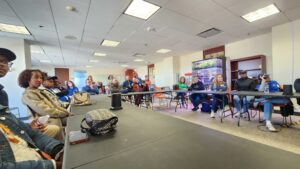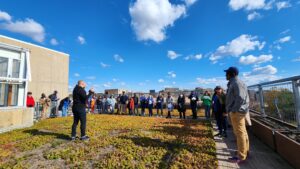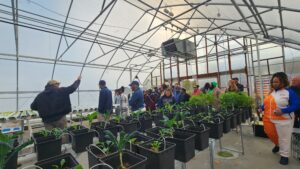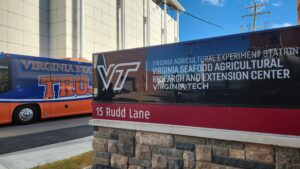Progress report for SVA24-002
Project Information
Virginia SARE is a collaborative effort between Virginia State University (VSU) and Virginia Tech (VT). SARE at VSU focuses on providing train-the-trainer opportunities for educators in agriculture and natural resources (ANR) who help small-scale farmers, especially the undeserved farmers. VSU SARE, in general, provides travel scholarships, offers mini-PDP grants, sponsors field days and workshops, organizes sustainable agriculture tours, and provides SARE publications of various formats to educators engaged in sustainable agriculture. In the 2024/25 fiscal year, VSU SARE will offer competitive scholarships for ANR educators to receive sustainable agriculture related trainings, with a focus in the areas of healthy soils, urban agriculture, climate smart technologies, and overall market diversification for meat, milk, vegetable, and fruit producers. These scholarships will cover event registration and travel expenses. Educators at all levels of expertise may apply for the scholarship towards trainings that best address the needs in their service regions/counties. VSU SARE will consider scholarship applications for both in-state and out-state trainings. Possible training opportunities include, but not limited to, those offered by Virginia Biological Farming Association, Future Harvest, University of Maryland Eastern Shore Small Farm Program, American Forage & Grassland Council, Mid-Atlantic Fruit & Vegetable Convention, Southern SAWG, and Carolina Farm Stewardship Association. VSU SARE will also sponsor sustainable agriculture field days and workshops taking place on VSU’s Randolph Farm. The VSU SARE Program Assistant will assist the SARE Coordinator in all activities stated above for the 2024 fiscal year and help with program evaluation and reporting.
The objectives of VSU 2024 Model State Program continue to be the professional development for ANR educators and educational outreach regarding sustainable agricultural practices reflected in Southern Region SARE programs, partnering agencies’ (i.e., NRCS, FSA, SWCD, Farm Credit) existing training programs, and other planned events by sustainable agriculture organizations.
Much of the efforts will be concentrated on offering travel scholarships for SARE-defined agricultural educators to attend in-state and/or out-state trainings, such as those offered by Virginia Biological Farming Association, Future Harvest, University of Maryland Eastern Shore Small Farm Program, American Forage & Grassland Council, Mid-Atlantic Fruit & Vegetable Convention, Southern SAWG, and Carolina Farm Stewardship Association. We plan to offer scholarships to 30 educators that include Extension Agents, NRCS Agents, Soil and Water Conservation District personnel, and Virginia State University Small Farm Outreach Program Assistants. We will specifically focus on offering scholarships related to strengthen educational outreach programs around soil health, urban agriculture, climate smart technologies, and farm-to-table connections in the food system value chain, enhance the capabilities of Extension and USDA personnel to highlight sustainable farming practices, support typically underserved audiences, and increase the knowledge and visibility of SARE's grants and programs.
Additional effort will be placed on engaging mentor farmers in sustainable agriculture practices during the Randolph Farm Day at Virginia State University. Through this effort approximately 25 mentor farmers and 75 regular farmers, including beginning farmers, will be exposed to practices such as high tunnel crop production, sustainable grazing systems, efficient irrigation practices, and SARE programs in Virginia. Many nearby Extension agents and Small Farm Outreach Program Assistants regularly attend the Farm Day.
Advisors
Education
Mostly with presentations, field demonstrations and providing training scholarships for extension educator.
Education & Outreach Initiatives
To educate and train extension professionals from Virginia Stat Extension in USDA SARE, and Research and Extension programs from other institutions.
As part of venue to promote SARE at Virginia State University, VSU SARE program initiated a sustainable agriculture bus tour during the VSU Extension Professional Week. This 2-day tour (Nov. 21-22) included a visit to the college of Agriculture, Urban Sustainability, and Environmental Sciences of University of District Columbia (UDC), and the Virginia Seafood Agricultural Research and Extension Center (AREC) of Virginia Tech in Hampton VA. At UDC, participants learned a great deal of the unique urban ag programs designed and thrived in the D.C. area. AT the Sea Food AREC, VSU extension educators received wealth knowledge and information about sustainable sea food production in VA and the VA ARECs in general. On the way back, the entire team visited the Extension Center at James City County where VSU SARE Coordinator and program assistant delivered a 30-minute introduction on SARE and its programs in the Southern Region.



Photo 1-3: Participants visiting UDC. Dean Dr. Jones gave introduction an tour of their sustainable urban ag program in DC.
Photo 4: Participants visited VT Sea Food AREC and learned sustainable aquaculture, and aquaponics.
Most VSU Extension educators became extension taskforce within the last three years. Majority of them does not know or is not familiar with the SARE program and other institutions promote sustainable agriculture and its practices. The visit to UDC opened their eyes on sustainable urban agriculture in large metropolitan areas. The sustainable sea food production including the control of invasive blue catfish in the Chesapeake Bay surprised most of the participants. The introduction of SARE made the participants fully aware of the SARE programs and its existence in VA, and more importantly the SARE funding and resources (publications). Our informal evaluation showed that 100% of the participants became aware of SARE and SRE programs. They became interested in SARE and will participate in SARE program including seeking funding support from SARE.
Educational & Outreach Activities
Participation summary:
Learning Outcomes
Project Outcomes
Face of SARE
VSU SARE coordinator has shared SARE information at Virginia Association of Biological Farming, Virginia Cooperative Extension (VCE) Winter Conference, VCE program team meetings, VCE new agents trainings, VSU field days and Ag. Fest, and some other events the coordinator acts as an Extension Specialist. SARE coordinators in Virginia have been discussing the possibility of a VA SARE website that should be up in 2025 after consulting with the SARE Advisory Committee.